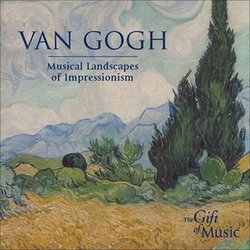| All Artists: Baltic Festival Orchestra;Royal Philharmonic Orchestra;and others Title: Van Gough; Musical Landscapes of Impressionism Members Wishing: 0 Total Copies: 0 Label: The Gift of Music Original Release Date: 1/1/2003 Re-Release Date: 3/5/2004 Genre: Classical Styles: Forms & Genres, Symphonies, Theatrical, Incidental & Program Music, Historical Periods, Romantic (c.1820-1910), Symphonies Number of Discs: 1 SwapaCD Credits: 1 UPC: 658592106121 |
Search - Baltic Festival Orchestra;Royal Philharmonic Orchestra;and others :: Van Gough; Musical Landscapes of Impressionism
 | Baltic Festival Orchestra;Royal Philharmonic Orchestra;and others Van Gough; Musical Landscapes of Impressionism Genre: Classical
The passion of Van Gogh's extraordinary painting is mirrored in the passionate music composed with scenes and places in mind by some of the great musicians of the nineteenth century. This album presents a European tour, fr... more » |
Larger Image |
CD Details
Synopsis
Product Description
The passion of Van Gogh's extraordinary painting is mirrored in the passionate music composed with scenes and places in mind by some of the great musicians of the nineteenth century. This album presents a European tour, from the landscape and people of Van Gogh's favourite place of work at Arles in Southern France, captured in music by Bizet, to musical impressions of Russia by Mussorgsky and Liszt's passionate evocation of the Hungarian spirit in his 'Hungarian Rhapsody'. Tchaikovsky was inspired by Italy to write his lovely 'Capriccio', while the Frenchman Chabrier journeyed even further into Southern Europe than Van Gogh himself, and was inspired to produce his famous tone poem 'Espana'. Vincent Van Gogh (1853-1890) is thought by many to have been the greatest Dutch painter and draughtsman after Rembrandt, and to be ranked alongside Cézanne and Gauguin as one of the greatest Post-Impressionist artists. His work was entirely produced during a single ten year period, and his painting conveys an Expressionist intensity which grew at least in part from his own inner turmoil and distress. He worked for a while as an art dealer, had several unhappy relationships with women and turned to missionary Christianity before discovering his true vocation as an artist. Always impoverished (he gave all his possessions to the poor while working as a lay preacher), Van Gogh sold only a very few of the more than 800 canvases and drawings which he produced during his extraordinarly creative decade. He moved to Paris for a while where he met Pissaro, Degas, Gauguin and others and he eventually settled at Arles in 1888. Partly under the influence of these forward looking artists, Van Gogh became obsessed by the symbolic and expressive values of colours. He began to use them for this purpose, as an expression of his humanitarian outlook, rather than for the reproduction of visual appearances, atmosphere, and light, which was the major preoccupation of the Impressionists. `Instead of trying to reproduce exactly what I have before my eyes,' he wrote, `I use colour more arbitrarily so as to express myself more forcibly'. He painted more than 200 canvases in 15 months at Arles, painting scenes as diverse as village streets and the interior of his own room, but sold none of them. He suffered continuously from nervous crises, including the famous incident in which he cut off part of his left ear, following an argument over the artists' co-operative he had attempted to found, initially on his own, but eventually with some support from Gauguin. The passion of Van Gogh's extraordinary painting is mirrored in the passionate music composed with scenes and places in mind by some of the great musicians of the nineteenth century. This album presents a European tour, from the landscape and people of Van Gogh's favourite place of work at Arles in Southern France, captured in music by Bizet, to musical impressions of Russia by Mussorgsky and Liszt's passionate evocation of the Hungarian spirit in his 'Hungarian Rhapsody'. Tchaikovsky was inspired by Italy to write his lovely 'Capriccio', while the Frenchman Chabrier journeyed even further into Southern Europe than Van Gogh himself, and was inspired to produce his famous tone poem 'Espana'.

 Track Listings (8) - Disc #1
Track Listings (8) - Disc #1